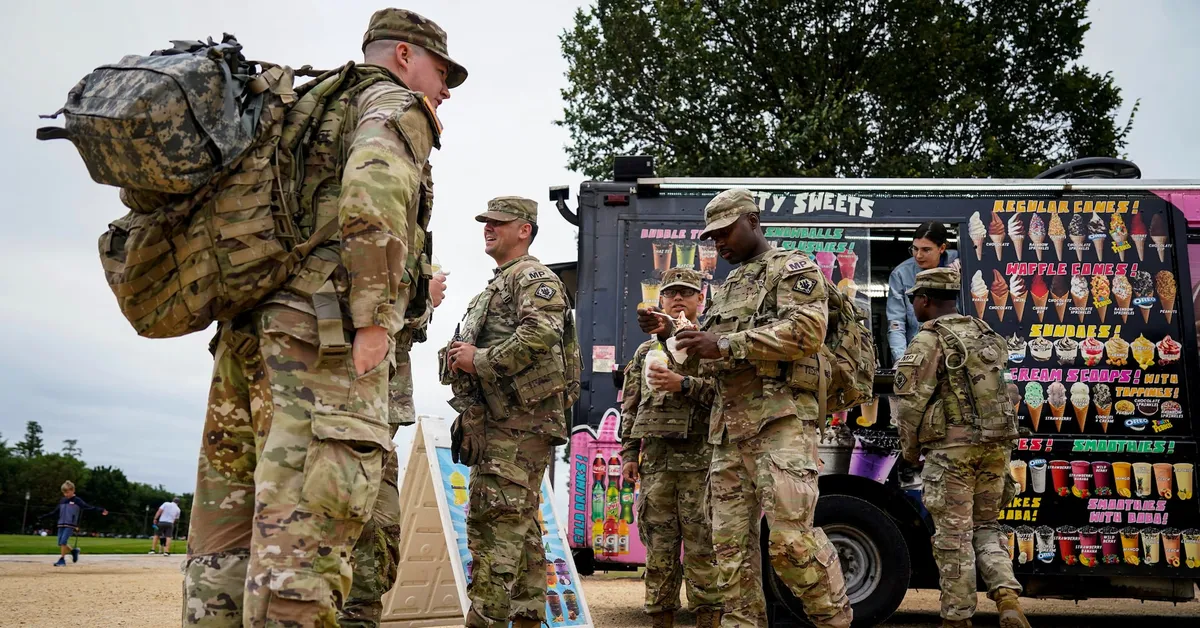
On August 23, 2023, hundreds of National Guard soldiers, clad in military fatigues and combat boots, were seen mingling with tourists on Washington's National Mall. This area, known for its historical significance, is considered one of the safest spots in the U.S. capital. While some local residents expressed their frustrations verbally, the soldiers maintained a calm demeanor, enjoying ice cream from nearby food trucks and taking selfies with tourists.
Among them was Sergeant Fox, a member of the West Virginia National Guard, who noted the relaxed nature of their assignment. "It's boring. We're not really doing much," he stated, opting not to disclose his first name. These troops are part of a larger deployment comprising nearly 2,000 National Guard members, including 1,200 from six Republican-led states. Their presence is a response to President Donald Trump's call for a federal crackdown on what he describes as a growing crime epidemic in Washington.
However, this narrative appears to contradict the reality of declining crime rates in the city. The concentration of troops near iconic landmarks such as the Washington Monument and the Lincoln Memorial has drawn criticism from local Democratic leaders. They argue that this military presence serves more as a show of power from Trump rather than a genuine effort to combat crime.
Washington Mayor Muriel Bowser expressed her skepticism regarding the deployment, stating that it was not intended to address crime issues. She also voiced concerns about the presence of an armed militia in the capital. While the soldiers observed by Reuters were unarmed, the Pentagon announced that troops would soon be deployed with their service-issued weapons.
In stark contrast to the bustling National Mall, residents of Ward 8 in southeast Washington—an area grappling with the city's highest crime rates—reported no sight of National Guard troops. Many locals expressed a desire for military presence on their streets, with Shawana Turner, a housing case manager, stating, "I haven't seen any. This is where they need to be."
The Joint Task Force for the District of Columbia, leading the crime crackdown, clarified that troop deployment is determined by requests from law enforcement agencies. Abigail Jackson, a White House spokeswoman, pointed out that while National Guard troops are not conducting arrests, they play a crucial role in protecting federal assets and providing a visible law enforcement presence. This deployment is part of a broader surge of local and federal law enforcement agents in Washington, including the FBI, conducting active operations since Trump announced the federalization of law enforcement in the district.
Historically, deploying troops on American streets has been rare and contentious. The National Guard has been utilized in the past for heightened security during presidential inaugurations and significant protests, notably after the January 6, 2021, riot at the U.S. Capitol. However, the current deployment's legitimacy is under scrutiny due to the city's declining crime statistics and the minimal involvement of troops in actual crime-fighting efforts.
Randy Manner, a retired National Guard major general, expressed concerns that this deployment might signal a trend of sending National Guard troops into other Democratic-led cities. "Not in our lifetimes has a president said that I'm going to use uniformed soldiers to reduce crime," Manner remarked, indicating that we may see similar deployments in other urban areas in the near future.
Despite the controversial nature of the deployment, some visitors to Washington welcomed the presence of the National Guard. Anu Pokharel, a software engineer visiting with his family from Boston, noted that the environment felt "cleaner and safer" due to the soldiers' visible presence. As they strolled through the National Mall, some guardsmen indicated to reporters that they did not anticipate engaging in arrests. Specialist Nevaeh Lekanudos from West Virginia's National Guard mentioned that their deployment allows local law enforcement to focus on their essential duties.
In total, Reuters spoke with 20 National Guard members from various states, including West Virginia, South Carolina, Mississippi, and Tennessee. Most of the soldiers reported having been instructed not to engage with the media directly, instead producing printed statements that highlighted their mission to support district and federal law enforcement while maintaining the beauty and safety of Washington, D.C.
As this situation evolves, the implications of the National Guard's presence in the capital continue to spark debate, raising questions about the intersection of politics, crime, and public safety.